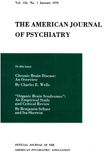AFFECTIVE LEARNING AND THE STUDENT-TEACHER RELATIONSHIP
Abstract
Psychiatry has been challenged to contribute to a solution for pressing social problems. The direction of this contribution can be made through the field of education. The medical school provides a good laboratory for the study of the learning process that leads to acceptable and constructive social values. This involves affective learning, and psychiatric understanding can contribute to the development of techniques for teaching in this area.
In a teaching situation which was highly charged emotionally it was found that the use of group and individual psychotherapeutic approaches resulted in a high incidence of validated evidence of successful affective learning. It was also found that there is a close parallel between the student-teacher and the patient-physician relationship, and between the learning and the psychotherapeutic processes. It was obvious that the mechanisms of identification and transfer of attitudes, which are so important in this type of learning, are facilitated by the setting up of a therapeutic milieu. This would indicate that the teacher should have a therapeutic orientation in addition to the other qualifications mentioned by Whitehorn(5).
The student-teacher relationship can be a therapeutic one and should be, when emotionally determined attitudes prejudice the learning process. The awareness of the teacher of the students' need for a special kind of relationship in such situations has an obvious application in the whole field of education. Psychiatry can do much in helping the teacher become aware of the emotional factors involved by setting up teaching programs within the educational systems that will allow the teacher to have the experience that brings about this awareness.
Access content
To read the fulltext, please use one of the options below to sign in or purchase access.- Personal login
- Institutional Login
- Sign in via OpenAthens
- Register for access
-
Please login/register if you wish to pair your device and check access availability.
Not a subscriber?
PsychiatryOnline subscription options offer access to the DSM-5 library, books, journals, CME, and patient resources. This all-in-one virtual library provides psychiatrists and mental health professionals with key resources for diagnosis, treatment, research, and professional development.
Need more help? PsychiatryOnline Customer Service may be reached by emailing [email protected] or by calling 800-368-5777 (in the U.S.) or 703-907-7322 (outside the U.S.).



